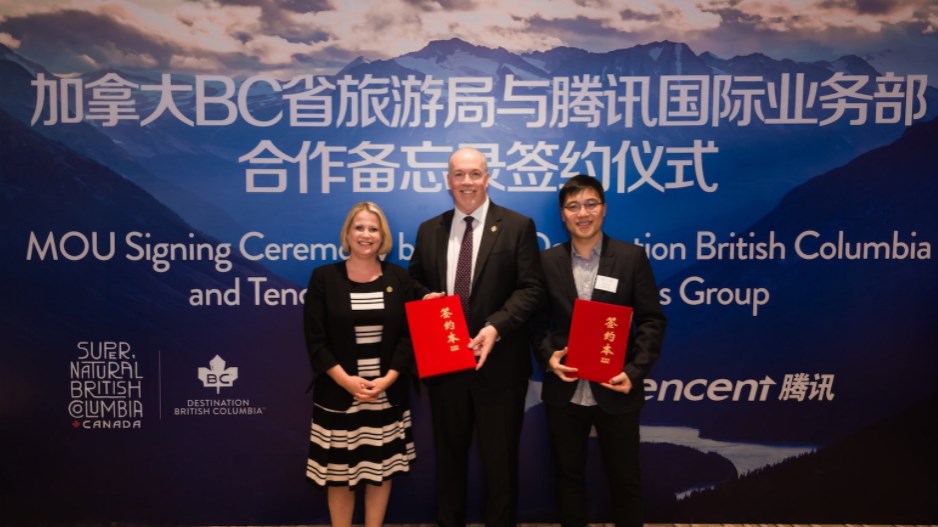The BC NDP remains silent on whether or not it will continue to support the further encroachment of China’s Belt and Road Initiative into British Columbia, if elected.
“The B.C. government regularly works with foreign countries, including China, when it comes to trade and industries that affect British Columbians,” stated an NDP spokesperson by email Sunday, after the party had been asked several times by Glacier Media for its future trade policy with China and how it may address growing concerns about that country’s human rights violations, including against B.C. residents, allegedly.
The NDP says it too, like the BC Liberal Party, will maintain a hands-off approach to raising such human rights matters with Chinese trade officials in the future.
“As a party and a government, we believe strongly in safeguarding human rights. However, foreign policy relations are the responsibility of the federal government, not the provincial government,” said the NDP, providing no indication it may take any such concerns to Ottawa.
However, while the BC NDP may defer human rights matters, the provincial government has significant autonomy to craft provincial trade policy with other nations, including authoritarian ones that are unsanctioned by Canada, such as China.
Premier John Horgan has previously declined Glacier Media’s request to address why his government continues to support a memorandum of understanding (MOU) on China’s Belt and Road Initiative (BRI), which was signed in 2016 by the BC Liberals with Guangdong province and remains on the books under his party’s governance. The controversial agreement is intended to foster increased economic, social and cultural ties between the countries.
Last week, BC Liberal leader Andrew Wilkinson was asked similar questions. Wilkinson also deferred his party’s future trade policy with China to the federal government; however, he did specifically voice concern about detained Canadians following the December 2018 arrest of Huawei CFO Meng Wanzhou.
Neither party has stated their trade policy in their election platforms ahead of the October 24 election.
Horgan’s silence on what is presently happening to Hong Kong’s democratic system and values under a new national security law does not sit well with many British Columbians of Hong Kong descent, said Jane Li, a member of local pro-democracy group Vancouver Hong Kong Political Activists.
“Isn’t it the province’s responsibility to protect B.C. residents and their safety and interests here?” asked Li, whose group contends Canadians are being harassed by agents of the Chinese Communist Party (CCP).
The activists also report threats being made against their family members overseas meant to suppress criticism of the authoritarian regime here in Canada.
“These issues are heavily provincial and municipal,” said Li. “It isn’t a matter that a provincial politician can just defer and say, ‘I’ll just let the federal government deal with it.’”
In this respect, Li says Horgan – and others – are ignoring the concerns of Chinese-Canadians who believe in democracy and personal liberty. She suggested newer mainland Chinese immigrants are also repressed and threatened.
Li’s activist colleague Jody Chan, who uses an alias to protect her family from threats, concurred.
“What I want the provincial government to understand is the CCP is very actively approaching municipal and provincial politicians and actively interfering in local and provincial politics. They are doing this to bypass federal oversight,” contends Chan.
Li and Chan are also part of a coalition group called Alliance Canada Hong Kong running an election campaign called “No BC for Xi,” with Xi being China President Xi Jingping. The coalition is canvassing political candidates, asking them if they will decline gifts from CCP-linked organizations and people and if they will still support the BRI in B.C.
One NDP candidate has spoken out at a local level to the campaign.
“I pledge to decline any gifts or donations from the CCP, and secondly, I will reject CCP belt and road initiatives,” stated Richmond North Centre candidate Jaeden Dela Torre.
In May, an Angus Reid poll showed just 16% of Canadians held a favourable view of China. And, when asked about the country’s approach to relations with China, 76% said Canada should prioritize human rights and the rule of law over economic opportunity.
The provincial election takes place this Saturday.




